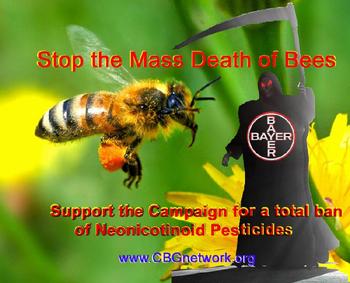As with any intervention by science meant to aid man produce food more efficiently there are often negative results on the environment.
Large corporations dominate in advanced nations' agricultural system and their profits and interest come into play. This in turn tends to corrupt or at the very least slant scientific studies in the hope of supporting the positions of the corporation. However, there is often bias on the other side as well since environmentalism has become for some a cause that is to be pushed forward to save the planet and the environment. Often environmentalists believe that they know what is the case, namely that their opposition is manipulating the facts and is concerned only with profits and not the environment even though in many cases the facts may be exceedingly complex and open to dispute. However, in the case of the neonicotinoids evidence is accumulating to show that they produce enough damage to be severely limited in their application and perhaps even banned. Raine discovered that bees treated with neonicotinoids showed the neurological effects of the toxins in their behavior: "When the neonicotinoid-treated bees go out of the colony for the first time to look for flowers, something about their exposure to that pesticide means that they’re less able to collect as much pollen as the bees that are untreated. And that impact only gets worse over time, because the untreated bees improve their performance and their ability.” The consequences of this lack of performance is smaller colonies with fewer queens and fewer colonies. Dr. Raine notes that pollinators, including both honeybees and wild pollinators are in decline around the world. However, as others have pointed out there are a number of different causes of this. Pierre Petelle, vice-president of chemistry at CropLife Canada claims that the "neonics" as he calls them are not one of the causes. However, even he admits that there have been some problems. In 2012 dust raised from their application did drift onto some bee colonies killing the bees. He claims that farmers and manufacturers are working to change the way that the pesticides are applied to avoid this happening again. There are increases in the number of bee colony collapses in many different countries. While neonics are likely one cause of this phenomenon there are numerous other factors. Often the factors work together to exacerbate the problem. Among the causes of colony collapse(CCD) are the varroa mite that spreads a virus: "According to a 2007 article, the mite Varroa destructor remains the world's most destructive honey bee killer, due in part to the viruses it carries including deformed wing virus and acute bee paralysis virus, which have both been implicated in CCD.[103][105] Affliction with Varroa mites also tends to weaken the immune system of the bees. Dr. Enesto Guzman, an entomological researcher at the University of Guelph in Canada, studied 413 Ontario bee colonies in 2007–08. About 27% of hives did not survive the winter, and the Varroa mite was identified as the cause in 85% of the cases.[106] As such, Varroa mites have been considered as a possible cause of CCD, though not all dying colonies contain these mites.[107] There are debates about the effects of neonics on birds as well. Christy Morrisey, from the University of Saskatchewan in Saskatoon found just last year that 90 percent of prairie potholes had small amounts of neonics. This means that the chemicals stayed in the soil and washed into the water. Morrissey said: "Insecticides or pesticides in general are not supposed to be on the market if they persist [in the environment. We do not want chemicals that are designed to kill lasting in the environment for weeks, months or years. …You want pesticides to be applied, do their job, kill the pest and then be gone." Dr. Morrisey is now studying how the neonics in the water may be affecting the aquatic insects and also the health of tree swallows nearby. He said: "We do not want chemicals that are designed to kill lasting in the environment for weeks, months or years." A Dutch study published this summer showed there were annual declines in insect-eating birds in areas that had higher surface-water concentrations of a popular type of neonic. Pettell of CropLife claims that the concentrations of neonics that Morrissey finds are too low to have any effect on aquatic insects. Industry studies on the water flea show that there is no danger to aquatic insects or wildlife. Pettell may be correct in his remarks about Morrissey's findings but the industry studies are themselves an example of slanted science. The water flea is according to Morrissey compared to other insects tested on average about 1,000 times less sensitive to neonics. She also complained that compared to the aquatic insects that birds like to eat it is between 10,000 and 100,000 less sensitive. If Morrissey is correct it is hardly surprising that the water flea is not hurt by the neonics in the water. Even if the pesticides are not banned at the very least their use should be restricted. As seed coatings they are used as a prophylactic even in fields where there are no insect infestations. In Canada all canola and corn seeds are coated and they are used in seeds of some other crops as well such as soybeans. A recent report of the Task Force on Systemic Pesticides analyzes 800 different studies and concluded that pesticides including neonics are having widespread effects on ecosystems far beyond killing crop pests. The scientists involved recommend that there should be a plan for a global phasing out of the chemicals or at the very least a plan that would see farmers use pesticides only when their crops actually are threatened by insect pests.
0 Comments
Your comment will be posted after it is approved.
Leave a Reply. |
Like this writer's work please donate:
Ken Hanly
Ken is a retired philosophy professor living in the boondocks of Manitoba, Canada, with his Filipina wife. He enjoys reading the news and writing articles. Politically Ken is on the far left of the political spectrum on many issues.
Archives
November 2016
Categories
All
|

 RSS Feed
RSS Feed

